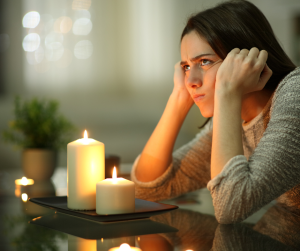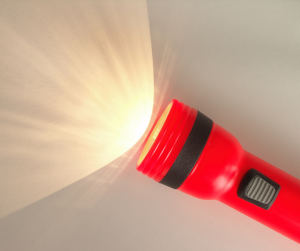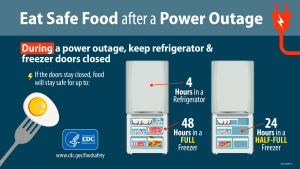Power outages can occur for several reasons, including severe weather (such as storms, tropical depressions, or hurricanes), equipment failure, overload of the power grid, accidents, or routine maintenance. When a power outage occurs, the affected area experiences a loss of electrical power, which can have several consequences. It can be scary and cause uncertainty.
People can be caught off guard and panic. They wonder what should be done. We all should have a plan for possible power outages and know what we would do, should it happen.

Here are some ideas and suggestions to consider.
15 tips for when the power goes out –
- Flashlights, battery-powered lanterns, and batteries should be part of your disaster kit. Make sure these items are easy to find, so you don’t have to search in the dark to locate them. I have a “power-out-box”. My box contains flashlights, battery packs, and battery-powered lanterns.
2. Give everyone in the home a flashlight to keep them safe from trips and falls. The elderly are most at risk for a potential slip or fall. It is too easy to trip over pets, toys, or a throw rug when you can’t see them in the dark.

3. With temperatures on the rise, battery-operated fans are a good idea when the power goes out and so does the air conditioning. It may get extremely hot without air conditioning. A small fan for each family member may keep everyone cool and less cranky when it does get hot.
4. A battery-operated radio and TV are important to make sure you know what’s going on locally. Stay connected.
5. Turn your refrigerator to its coldest setting. Avoid opening and closing it once the power goes out. A refrigerator will stay cool for about 4 hours without power and a freezer lasts about 24 hours in a half-full freezer. Refrigerated or frozen foods may not be safe to eat after the loss of power. When in doubt, toss it out. https://www.cdc.gov/foodsafety/food-safety-during-a-power-outage.html
6. Don’t keep opening and closing the refrigerator and freezer for beverages and ice. Transfer beverages to a cooler with ice. Access beverages directly from the cooler instead of continually opening and closing the refrigerator. If the doors stay closed, the food will stay safe to eat for a longer period.

7. When the power goes out, eat what’s in the refrigerator first, the freezer next, and save canned food for last. Again, refrigerated, or frozen foods may not be safe to eat after the loss of power. Never taste food to determine if it is safe to eat. Keep your food safe to eat!
8. One of my favorite power outage hacks is the – frozen cup of water with a penny placed on top, kept in the freezer. The penny stays on top of the frozen water if the power doesn’t go out. If you evacuate and return to your home, you can tell if the power went out by looking at the placement of the penny. If it is still on top of the frozen water, then power was not lost. If the penny is now refrozen inside the ice, you can be pretty certain that the power was out allowing the water to thaw and then refreeze. Here is a photo of the cup in my freezer.

- Use portable generators and grills outside only in a well-ventilated area. Make sure they are away from any windows. Never use them inside your home.
https://www.osha.gov/sites/default/files/publications/OSHA3286.pdf https://www.fema.gov/fact-sheet/use-generators-safely-home
10. If the power goes out, use flashlights or other battery-powered lights, if possible, instead of candles. If you must use them, place them in safe holders away from anything that could catch fire. Never leave a burning candle unattended. https://www.cdc.gov/disasters/psa/candles.html Consider using the flashlight app on your smartphone, as able.
11. Keep matches and lighters away from small children. Avoid any possible fire hazards. Always supervise children. Keep children safe.
12. Turn off and unplug appliances in case of potential power surges. Protect your electronics from possible power surges. Examples may include surface computers, gaming systems, TVs, cell phones, and laptops.
13. Watch local news or listen to the radio for important updates, using your battery-operated devices and/or your cell phone. You may learn about boil water advisories, potential area tornado warnings, and more.
14. Make sure your home is secure. Things can get scary in the dark. Unfortunately, thieves and criminals may take the opportunity to act when lights are out, and security systems are not working properly. Be alert. Safety first.
15. Check on your neighbors to make sure they have flashlights, batteries, food, and water. In the end, kindness matters.

References/Resources
Homeowner’s Handbook – Download an electronic copy of the handbook to prepare for disasters. https://disaster.ifas.ufl.edu/media/disasterifasufledu-/docs/Florida-Homeowners-Handbook.pdf
FEMA – National Hurricane Program (NHP) provides data, resources and technical assistance for hurricane planning and response. https://www.fema.gov/emergency-managers/risk-management/hurricanes
Engage in Food Safety Behaviors– https://blogs.ifas.ufl.edu/browardco/2022/02/08/engaging-in-food-safety-behaviors-does-matter/
An equal opportunity institution.
 10
10
